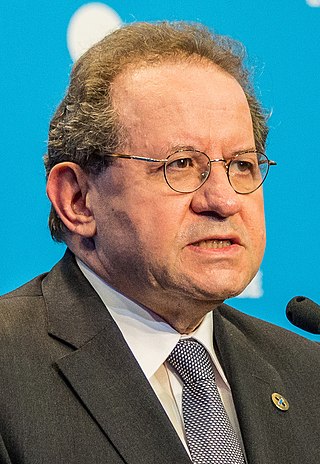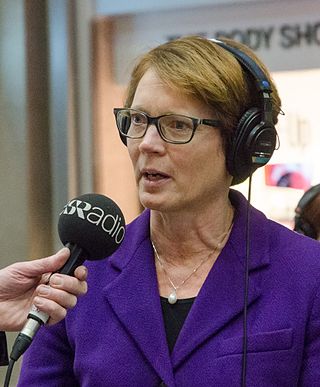
Vítor Manuel Ribeiro Constâncio is a Portuguese economist and academic who most recently served as Vice President of the European Central Bank,from 2010 to 2018. He previously served as Minister of Finance in 1978 and Governor of the Bank of Portugal from 1985 to 1986 and from 2000 to 2010.
A non-performing loan (NPL) is a bank loan that is subject to late repayment or is unlikely to be repaid by the borrower in full. Non-performing loans represent a major challenge for the banking sector,as they reduce profitability. They are often claimed to prevent banks from lending more to businesses and consumers,which in turn slows economic growth,although this theory is disputed.

Yves Mersch is a Luxembourgish jurist and lawyer who served as a member of the Executive Board of the European Central Bank from 2012 to 2020. He previously served as first Governor of the Central Bank of Luxembourg from 1998 to 2012.

The European Insurance and Occupational Pensions Authority (EIOPA) is a European Union financial regulatory agency. It was established in 2011 under EU Regulation 1094/2010.
The European System of Financial Supervision (ESFS) is the framework for financial supervision in the European Union that has been in operation since 2011. The system consists of the European Supervisory Authorities (ESAs),the European Systemic Risk Board,the Joint Committee of the European Supervisory Authorities,and the national supervisory authorities of EU member states. It was proposed by the European Commission in 2009 in response to the financial crisis of 2007–08.

The European Banking Authority (EBA) is a regulatory agency of the European Union headquartered in La Défense,Île-de-France. Its activities include conducting stress tests on European banks to increase transparency in the European financial system and identifying weaknesses in banks' capital structures.

Klaas Henderikus Willem Knot is a Dutch economist and central banker who is the current President of the Dutch central bank De Nederlandsche Bank (DNB). In this capacity he serves as a member of the Governing Council of the European Central Bank (ECB),as well as of the Board of Governors of the International Monetary Fund (IMF). Knot also holds a position as Professor in Monetary Stability at the University of Amsterdam and honorary professor at the University of Groningen.
Claudia Maria Buch is a German economist who currently serves as served as Chair of the ECB Supervisory Board since 2024. She previously was a Vice President of the Bundesbank from 2014 to 2023.

European Banking Supervision,also known as the Single Supervisory Mechanism (SSM),is the policy framework for the prudential supervision of banks in the euro area. It is centered on the European Central Bank (ECB),whose supervisory arm is referred to as ECB Banking Supervision. EU member states outside of the euro area can also participate on a voluntary basis,as was the case of Bulgaria as of late 2023. European Banking Supervision was established by Regulation 1024/2013 of the Council,also known as the SSM Regulation,which also created its central decision-making body,the ECB Supervisory Board.

Sabine Lautenschläger is a German jurist who served as a member of the Executive Board of the European Central Bank from 2014 to 2019. She previously served as vice-president of the Deutsche Bundesbank from 2011 to 2013.

Danièle Nouy is a French public servant who served as Chair of the Supervisory Board at the European Central Bank from 1 January 2014 to 31 December 2018. She was regarded as the effective head of European Banking Supervision.
The banking union refers to the transfer of responsibility for banking policy from the national to the European Union (EU) level in several EU member states,initiated in 2012 as a response to the Eurozone crisis. The motivation for banking union was the fragility of numerous banks in the Eurozone,and the identification of a vicious circle between credit conditions for these banks and the sovereign credit of their respective home countries. In several countries,private debts arising from a property bubble were transferred to the respective sovereign as a result of banking system bailouts and government responses to slowing economies post-bubble. Conversely,weakness in sovereign credit resulted in deterioration of the balance sheet position of the banking sector,not least because of high domestic sovereign exposures of the banks.
The European Union-wide banking stress test 2014 was conducted by the European Banking Authority in order to assess the resilience of financial institutions in the European Union to a hypothetical adverse market scenario. In total,123 major EU banks participated in the exercise. 24 banks failed the test with an overall capital shortfall of EUR 24.2 billion under the adverse scenario.
The European Union-wide banking stress test 2016 was conducted by the European Banking Authority (EBA) in order to assess the resilience of financial institutions in the European Union to a hypothetical adverse market scenario. The stress test was formally launched on 24 February 2016 with a publication of the final methodology and templates as well as the scenarios. It covered over 70% of the national banking-industry assets in the euro area,each EU member state and Norway. 53 EU banks participated in the exercise,39 of which are directly supervised by the ECB under European Banking Supervision. The outcomes of the exercise,including banks' individual results,were published on 29 July 2016,at 22:00 CET.

JoséManuel Campa Fernández is a Spanish economist,economy professor and politician who has been serving as the chairperson of the European Banking Authority since May 2019. Prior to this,he has been a senior member of Santander Bank and has previously served as the 10th Secretary of State for Economy in the Government of Spain.
Sharon Donnery is an Irish economist and financial regulator who has served as a Deputy Governor of the Central Bank of Ireland since March 2016. She served as the Governor of the Central Bank of Ireland on an acting basis from June 2019 to August 2019,having occupied increasingly senior positions in economics,consumer protection and regulatory roles since joining the body in 1996. As of 1 July 2022 she is responsible for financial regulation in Ireland. The legislation underpinning the role of the Central Bank of Ireland sets out four statutory positions:Governor,Head of Central Banking,Head of Financial Regulation and Registrar of Credit Unions. As of July 2022,Donnery has the distinction of being the only person to have held all four positions,albeit that she occupied the Governor role on an acting basis.
Helmut Ettl is an Austrian economist and European banking and finance specialist.

Kerstin Margareta af Jochnick is a Swedish banker and economist. She is currently serving as a member of the ECB Supervisory Board,and was the former First Deputy Governor of the Sveriges Riksbank,the central bank of Sweden.

The Austrian Financial Market Authority is Austria's integrated financial regulatory authority and has been its national competent authority within European Banking Supervision since 2014. It is responsible for the supervision of credit institutions,payment institutions,insurance companies,pension funds,Fund managers,licensed securities service providers,and stock exchanges.

The Supervisory Board of the European Central Bank or ECB Supervisory Board is the main operational decision-making within the European Central Bank on bank supervision matters,within the framework of European Banking Supervision. It meets twice a month to discuss,plan and carry out the ECB's supervisory tasks. It is not,however,the ultimate decision-making body,as it only prepares draft decisions for the Governing Council under a no-objection procedure.











